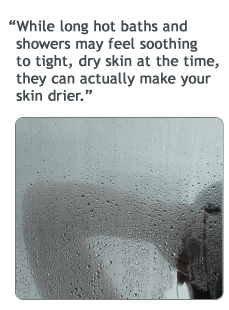
Odds are, cold weather and being inside with constant heat may have given you xerosis. Don’t worry. It’s not a dread disease but simply the medical term for dry skin. According to the National Institutes of Health (NIH), xerosis can cause your skin to be scaly, itchy, and red and sometimes even develop fine cracks – and it typically gets worse in the winter months.
That’s because temperatures and blustery winds outside and constant heat indoors all contribute to dry skin. But with spring just around the corner, it’s time to think about getting dry skin under control for shorts and bathing suit weather.
To find out the best love-your-skin-again strategies, Synergy talked to dermatologist Sulochana Bhandarkar, MD, Assistant Professor of Dermatology in the Emory University School of Medicine.
Taking care of your dry skin
Dr. Bhandarkar explains that even people who don’t generally have dry skin can develop the problem during the winter months. Grocery and drug store shelves are loaded with products that claim to treat this condition. But how do you know what really works to hydrate dry skin?
Ointments, which are oil-based, are better ways to moisturize than lotions and cream, which are water-based, Dr. Bhandarkar answers. “Ointments hold moisture longer than lotions or creams,” she explains. “ Some examples of good ointment-type moisturizers for dry skin are Vaseline jelly, Aquaphor, Cetaphil and Eucerin.”

While long hot baths and showers may feel soothing to tight, dry skin at the time, they can actually make your skin drier. “Hot baths and showers can dry out your skin more than lukewarm water. We generally advise short, warm showers, only about five minutes long -- especially for patients with eczema (inflammation of the skin),” Dr. Bhandarkar tells Synergy. She adds that it is important to pat dry your skin when you are finished with your shower. Then apply your ointment-type moisturizer immediately.
When to see a dermatologist
While the tightness you may feel on your skin during cold weather is usually due to dry skin, sometimes the flaking that occurs is a sign of mild eczema or dermatitis (both terms refer to inflammation of the skin). Dr. Bhandarkar points out that wool worn in wintertime can irritate sensitive skin and cause irritant or allergic dermatitis, too. A dermatologist can diagnose these conditions and set up a specific treatment plan for soothing and smoothing.
“Xerosis or dry skin can also be associated with external injury such as excessive usage of soap and water. Or it can also be a sign of internal problems such as hypothyroidism (a condition in which the thyroid gland does not make enough thyroid hormone) or renal insufficiency (when kidneys fail to adequately filter waste products from the blood),” Dr. Bhandarkar says. “ In general, xerosis that is not responding to emollient moisturizers should be evaluated by a dermatologist. “
Looking ahead to sunny days
Is it true that having dry skin means you‘ll have more and deeper wrinkles? While advertisements for creams and cosmetics often imply this, Dr. Bhandarkar says the cause of wrinkles is simply aging. However, exposure to sunshine and smoking contribute to significant and premature wrinkling, too.
“Wrinkles, also called rhytides, are a normal part of skin aging and occur with time due to the constant usage of facial muscles of movement. For example, constant usage of the procerus and corrugator muscles on the face causes prominent frown lines between the eyebrows,” she explains. “Dry skin shouldn’t have a direct impact on causing wrinkles though moisturizing your skin with moisturizers that contain sunscreen will have a protective effect on wrinkles due to sun protection.”
 With sunnier days ahead, it’s time for a reminder that you should use a sunscreen. Actually, for optimum skin protection, it’s wise to use a sunscreen year round -- whether you are inside most of the day or not.
“It’s a common misconception that people who work indoors all day don’t need sunscreen. People spend a significant time driving to work and the car window glass doesn’t block UVA light which can cause photoaging and even skin cancer,” Dr. Bhandarkar emphasizes. “Many moisturizers come with sunscreen, so it is a good idea to use some in the morning before driving to work.”
She adds that while winter can exacerbate dry skin, spring and summer can trigger or worsen other skin conditions that are affected by sunlight -- including solar urticarial (a rare, sunlight induced allergic reaction that causes raised red skin welts), photocontact dermatitis ( an itchy rash that develops in some people from cologne or other topical substances when they are exposed to sunlight) and, of course, sunburns. Bottom line: in any season, if your skin condition doesn’t respond to simple self-care measures, contact your healthcare provider.
|